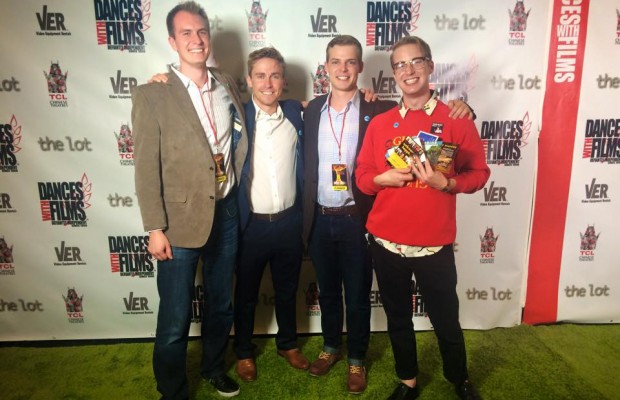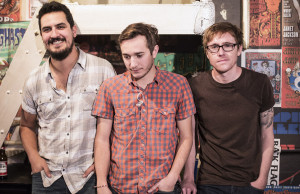Dances With Films Interview: Cast And Crew Of ‘Superior’

It’s 1969, during the height of the Vietnam War and Charlie is on his way to Michigan Tech University while his best friend Derek is anxiously counting the days until he becomes eligible for the draft. Before the two friends are forced to face their inevitable futures they decide to take a final adventure as kids. Together they embark on a 1,300 mile bike ride along Lake Superior. Thus begins the epic adventure that is director Edd Benda’s feature film debut, “Superior.”
The film debuted at the Dances with Films Festival in Los Angeles on June 5th. Hollywood Times Square recently got the chance to sit down with Benda, producer Alex Bell and cast members, Thatcher Robinson and Paul Stanko to discuss the film, shooting on-location, and making the world a better place.
So the film is set in Michigan, are you all from the Midwest?
Benda: I’m from the Midwest and one of our producers Steven Halstead is also a Midwest guy, but yeah as the writer and director that’s where I drew my inspiration.
I read that the film is inspired by a true story?
Benda: It is, it’s inspired by my uncle Carl and his cousin who took this bike ride in 1971, this 1,300-mile ride around Lake Superior. That kind of became the backdrop for me to tell a lot of stories within one. My dad is one of nine kids and they grew up, as Paul described it, in the “Footloose” household with no dancing and kind of a lot of restrictions on entertainment, so their source of adventure was to go out and create their own. And so what “Superior” became was kind of a conduit, a patchwork quilt if you will, of all their respective childhood adventures.
Since the original bike ride was in 1971 was there a particular reason why you set the movie in 1969?
Benda: In setting it against the backdrop of the Vietnam War and the Vietnam War draft, in researching and really beginning to understand that time period, 1969 kind of became an important crux for all of that in the United States. While the film isn’t about that and isn’t singularly dealing with that, it was important to create that environment and that community.
I appreciated that the film didn’t favor the Michigan Tech path, but it kind of paints a bleak picture of both paths, with all the imagery of death and literally sleeping in coffins…
Stanko: It’s interesting, when I got the script I actually saw it as an incredibly optimistic story, where it’s two young men seizing this moment in their lives to either surrender themselves to their futures and just go their separate ways, or you know, to take one last great adventure and really quite literally take their story into their own hands. I think particularly for my character Derek, there’s a big crossroads that he’s at in life and the choice is either a bleak future where people continue to force him in the directions that they believe he’s only suited for or there’s a chance to break free and be his own man. I think that the story and Ed’s directions and Alex’s cinematography really do a wonderful job of capturing those moments that we all have in our lives where we can either choose to continue down the path that’s easy or the path that’s been set for us, or break away and try to make our own adventure in this world. To me it’s a story of optimism and hope and that you’re never locked on to one road, there’s always a divergent path to take.
Yeah, you see that in the cinematography, there’s always literally crossroads and other paths.
Stanko: Crossroads! Yeah totally!
Benda: Alex here is our cinematographer so he certainly had that in mind.
What was the filming process like for you, on location in Michigan?
Stanko: Oh man, how much time do you have?
Robinson: How many bugs can you write about?
Benda: It’s a story that spans almost a month, on June 19th 2014 we loaded up three sedans, a pickup truck, and a trailer and we drove 3600 miles 3.5 days to this remote region in the upper peninsula of Michigan, where the reward for everybody weathering that journey was the 11 of us then crammed into a tiny little cabin where we got to live for the next month. So then we were in Michigan for 28 days; we filmed for 21 of them. We really built in a lot of time to kind of enjoy where we were, which was important to me and I think reflected a lot in the film is everybody had a strong sensibility of where we were and what we were doing. And then at the end of those 28 days we loaded up our 3 sedans and our pickup truck and our trailer that all had nicknames, and drove back to Los Angeles and I think one of my favorite moments of that road trip and simultaneously one of the most heartbreaking was we stopped in Barstow at a Chipotle to have lunch, and it was an unnecessary stop. We could have continued all the way to Los Angeles but we stopped to have this meal that we didn’t need because I believe, and I think that was reflected by a lot of our crew, is it was hard to come to grips with being back in Los Angeles and being back in the urban sprawl in the city because we lived this adventure for a month and I loved every minute of it, and it was hard to come back to reality.
Robinson: I’d say the buzzword if you need to describe or if you even can describe this whole process, the filming process, the production process in just a word it’s adventure. There’s no part of this film that isn’t an adventure and it continues! Even here at dances with films!
So what are you guys working on next?
Benda: Alex Bell and I have been working together for a while now and we have a few potential films down the pipeline, none of them far enough down the road to discuss at great lengths. Superior has been our singular focus for the last year and a half and will continue to be for the time being, but I look forward to having another Beyond the Porch production for the two of us. And certainly working with Paul and Thatcher a whole lot more in my career. This isn’t the last film. This is just the first one.
Robinson: As of now I have a tiny role in a film in August which I’m shooting for about a day in the bay area and from there on out there’s stuff maybe next year. But right now [the focus is] getting better in acting class. There’s always something to do, it’s never something where you can sit back and wait for the next thing.
Stanko: I am in a Harry Potter fan franchise called “Severus Snape and the Marauders,” and I play a young Remus Lupin in that, so that’s coming out in October. I’m also in a play right now called “Might as Well Live” that’s going up at the Hollywood Fringe Festival. It’s been amazing. That’s one of the great things about being in Los Angeles and I think these guys will agree with me, as an independent artist and that’s very much the circuit we’re a part of, there are wonderful opportunities. Dances with Films is a great one for film and Fringe is great for theater, but this is a city that really allows people to make art and to tell stories and it’s just cool to be here.
Bell: I do a lot of documentary work with the Salvation Army, so when the Nepal earthquake struck, they sent a team out to do disaster relief work and to set up displacement camps and get food distributions and medical aid, so I was part of a team that went out there to document that. Less than a week after the earthquake hit I was on the ground for 10 days getting to capture people making a difference in this world, so that was pretty cool and I’m right now preparing for a big event in London this month.
Stanko: See, Alex is out there making the world a better place while I’m pretending to be a wizard.
You know, everybody makes the world a better place in their own way.
Stanko: Yeah, right? That’s great.
There’s a scene where you, Paul, stop by the river and you leave something there and the camera pans on it but then it never really cuts back to what was left.
Benda: Earlier in the film they talk about being pragmatic with what they pack and we have kind of a brief little joke where Paul as the character Derek has severely overburdened his bicycle so when we stop by the stream it’s Derek acknowledging, ‘Alright I packed way too much stuff’ and he had to leave some stuff behind, he had to leave a lot of what he brought and really simplify his ride.
Stanko: It kind of was like in my mind, that was the moment that I let go of all the comforts and the things that I think I need to be successful and to survive, and the reality is all you need is a best friend and a bike and a hell of a lot of gumption. So that’s Paul Stanko’s esoteric and philosophical answer, that was the burden of life that we left behind.
Benda: That’s how I wrote it of course.



